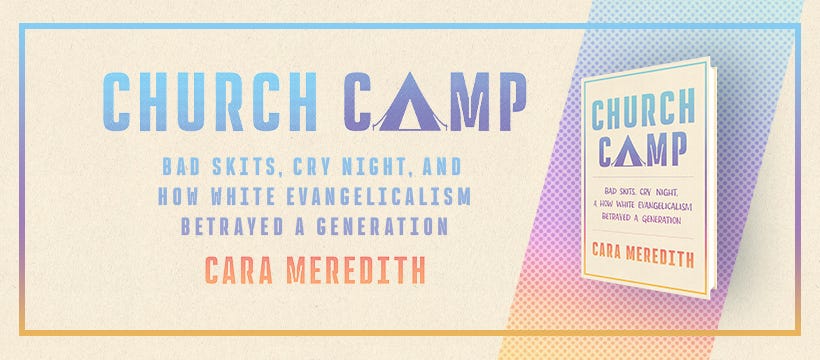The single question that broke me from white evangelicalism
Penal substitutionary atonement, shaming people, and a little bit of hell too
If there’s a single question that broke me from white evangelicalism, it was this: Why are we shaming people in order to communicate God’s love for them?
For years, I believed in a version of the Gospel that went something like this: God loves you. Jesus, who came down to earth, is a pretty cool dude. But because you’re human, your sin separates you from God. So the only thing you can do is believe that Jesus died for you on the cross — then you can be with that God who loves you forever!
A truncated version of the Four Spiritual Laws,1 the idea was made popular by Campus Crusade for Christ2 founder Bill Bright and adopted by a number of evangelical organizations in the late 50s and 60s.
At camp, it looked something like this:
Even though we had introduced campers to a man who desperately loved them and wanted to know them,3 the next morning we slapped them upside the head with their sin. I say this slightly in jest, but it’s like we called them beloved one moment and labeled them dirty rotten sinners the next. And then, at some of the camps, we drove home the message with an hour of fun in the mud pit or at messy games — because if we could just get them to understand their wretched sinfulness, through tangible, physical examples, no less, then they’d really know how much God loves them!
Y’all. It’s no wonder wide swaths of humans are deconstructing their experiences at church camps today.
Of course, this didn’t just happen at church camps. It also happened at Vacation Bible School, at youth groups, and from the pulpit too. The list goes on, because this was the formula that worked.4 It was the formula that got results, because according to this theory, which theologians call penal substitutionary atonement, “humans are left with no other choice. They have to make right a wrong.”5
As it goes, I want to leave you with a short excerpt from Church Camp. It’s a satirical piece, probably better intended for publication at a fine institution like The Onion, but it still tells the story pretty well.
Enjoy.
Penal substitutionary atonement, an atonement theory widely embraced by a number of conservatives, mostly within the Reformed tradition, is damaging children and youth at record numbers. A robust presence within much of white evangelicalism, its tenets are regularly preached from the pulpit, taught in Sunday school classes, and stated in bold font on the “What We Believe” section of church websites.
The atonement theory capitalizes on making people feel like a piece of shit in order to understand their need for God. Nowhere is this felt more than during the summer months, when thousands of children and youth attend church camps across the US.
“If I can make children feel dirty and worthless, then I’ve done my job,” Larry Goberry, a veteran camp speaker said. “They only have to marinate in their dirtiness for a day, sometimes even half a day, but then they’re primed and ready to hear the Good News!” According to Goberry, even though their worthlessness prevents them from having a relationship with God, children and youth don’t need to worry about anything.
“God loves you so much he killed his only son!” Goberry added. “That’s the Good News!”
The harmful theology is particularly damaging to those under the age of eighteen. Not only do they grow up believing God’s love is conditional and remain prone to guilt-induced, works-based models of faith, but they believe themselves worthless sacks of garbage.
“I’m a dirty rotten little sinner!” A ten-year-old girl shouted, as she stepped off the bus from summer camp.
“I’m a worthless piece of shit!” A seventeen-year-old boy added, high-fiving her at the bottom of the steps.
Opponents urge the Church to stop flipping the switch on God’s love and put an end to penal substitutionary atonement as a way of explaining the cross. Although the theory tends to work in the short-term, the outdated model ends up doing more harm than good. Record numbers of former campers are leaving the faith, report low self-esteem, and continue to unpack the harmful theology long into adulthood.
Proponents remain unconvinced.
“Why change what works?” One pastor stated in response to the accusation.
Church camps refused to comment, when asked.6
I dive deep into penal substitutionary atonement, hell, dangling carrots (and thumping sticks), and religious trauma. But also? I imagine other ways forward, because, dear reader, there are other, better ways forward.
If this post strikes something in you or resonates with you, I urge you to share it with a friend that might need to read it.
But also? Preorder the book. Join the launch team. If this distorted version of the Good News is part of your story too, help us get the word out, will you?
You’re a good one, you truly are—
Cara
https://campusministry.org/docs/tools/FourSpiritualLaws.pdf
Which is now, simply known as CRU.
I’m talking about Jesus, y’all.
And still works, present-tense, I should say, but all who ascribe to the theory.
Church Camp, page 84.
Church Camp, pages 86-87.





Ah yes, the original sin messaging that has compounded for general existing in patriarchy messaging that sent me straight into adulthood with zero sense of self-love, confidence, or worthiness. This God who made me terrible so he could save me from my terrible self? Stockholm Syndrome God. Anyway, you know I get it lol
PS
I say this with every bit of sincerity and seriousness: F*ck CRU.
Everyone seems to love the song Amazing Grace, but I hate the first line that says grace saved a wretch like me. Raised in a Baptist church, I agree that the church often can teach us we are unworthy. Sad.